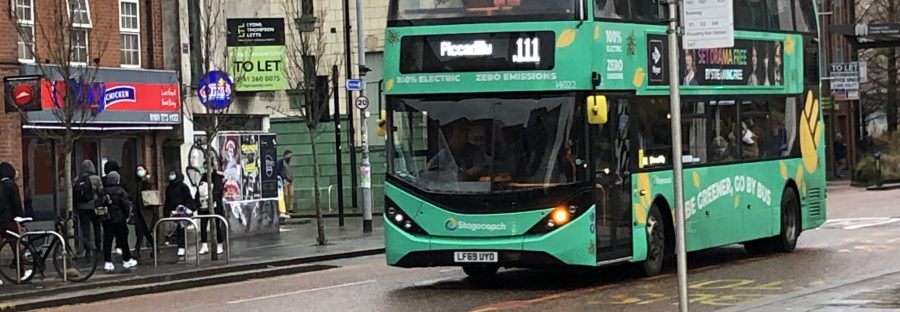Bus fares to be capped at £2 as part of Greater Manchester’s public transport reform
- Mayor Andy Burnham has announced that bus fares will be capped at £2
- The capped fares are a part of a larger scheme for a more accessible and sustainable public transport system
- The Mayor is wanting to work in partnership with the government to bring these plans to fruition
Bus passengers are set to be charged no more than £2 following Mayor Andy Burnham’s announcement for a price cap on bus tickets.
The new system will be cap adult fares for a single journey at £2, whilst fares for children will be no more than £1.
The scheme is more in line with London’s £1.65 ‘Hopper’ fare that the public have been wanting.
It means passengers will no longer have to afford £4.50 for a 20-minute journey.
These cheaper fares should come into effect by Autumn 2023 in some areas of Greater Manchester, with Bolton, Wigan, and parts of Salford and West Manchester specifically being the first to receive franchised services.
Bury, Rochdale, Oldham, and areas of North Manchester are set to follow by Spring 2024.
Meanwhile, Stockport, Tameside, South Manchester, and other parts of Salford are set to have the scheme implemented by the end of 2024.
From then, passengers will be able to take full advantage of capped fares on buses run by Transport for Greater Manchester (TfGM) across the whole region.
The £2 ticket will function as a ‘hopper’ fare, which means that the same ticket can be used for any change of bus within 60 minutes of the ticket being purchased, regardless of how many times a person changes buses within that hour.
A legal ruling last week made the new fares plan possible, as part of plans for a transport system that operates in the style of London’s transport.
This new approach takes control over buses away from profit-focused operators and places it in public hands instead.
It makes Greater Manchester the first region outside of London to have this power in more than 30 years.
This is all part of a £1.2bn five-year investment programme for a public transport reform in Greater Manchester, involving electric buses, new bus lanes, boosted connectivity between towns and cities, and high-tech ticketing and passenger information that has been prevalent in London for years.
The scheme is also in line with ambitions to clean up the air in Manchester and achieve the region’s 2038 carbon neutral target. Longer-term goals include extensions to the Metrolink, tram-trains, more cycling and walking routes and joining up HS2 to the network.
Mayor Andy Burnham has also claimed that Greater Manchester was setting a standard for other city-regions to follow suit when it comes to connecting villages, towns, and cities.
He added: “People need to be able to get to where they want to go without having to spend as much as £4 on a single trip.
“My ambition is that soon here in Greater Manchester it will be simpler, cheaper and more reliable to get around on public transport.
“We will make travelling by public transport more appealing, easier and, significantly, put our people before profits.
“Government has signalled its intention to support our ambitions many times over and we now need them to work in partnership with us, to help us turn our shared vision into a reality.”
Naturally, it’s all dependent on funding. The £135m needed to fund the transition to this new franchising model is secure due to a combination of sources which include the precept and local authority contributions, while a council tax rise coming in April will also boost the budget.
Local authorities have also raised £170m towards the longer-term vision.
However, most of the proposed changes, including the capped fares, are dependent on the Government’s £1.07bn to help improve Greater Manchester’s public transport, as well as a share of Boris Johnson’s £3bn ‘Bus Back Better’ money.
Greater Manchester has bid for £70m a year over three years from Boris Johnson’s ‘Bus Service Improvement’ fund, though we have yet to hear if this has been successful.
In regards to the city’s overall sustainability, Boris Johnson also told Manchester Evening News that an announcement on the Clean Air Zone was due soon.
Greater Manchester was first handed the powers to take back buses five years ago, as part of the devolution deal. However, there have been multiple obstacles such as public consultations and Covid that have delayed the roll-out.
Transport for Greater Manchester have continued to subsidise the network with the help of Government bailouts during the pandemic, funding routes that would have otherwise been axed by operators because they weren’t turning a profit.
These subsidies cost taxpayers £30m a year, with around £8m going to school services and £22m to the routes which don’t make money for the companies that run them.
A judge has ruled against the operators who sought to block reform because they thought the decision-making process was flawed, and an accelerated plan has been put into place, prioritising cheaper fares.
This scheme is an integral part in the ‘Bee Network’ which refers to a plan for a public transport system that brings together trains, trams, and buses alongside walking and cycling to create a model that is modern, sustainable, and accessible for Greater Manchester. The Bee Network’s philosophy is that connectivity across cities is vital for access to jobs and healthcare.
This sentiment is supported by the Greater Manchester Independent Prosperity Review, which discovered that better infrastructure that supports access to jobs in the city centre and local area will help parts of the region with lower productivity, pay and living standards.
The Mayor has repeatedly called on the government to work with Greater Manchester to provide a package of funding to support the transformation the Conservatives have promised.


